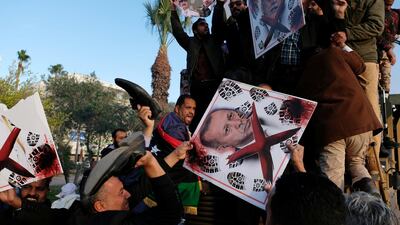French President Emmanuel Macron on Wednesday accused Turkey of breaching an agreement to halt foreign interference in Libya by sending warships and mercenaries to the North African country.
Following a meeting with Greek Prime Minister Kyriakos Mitsotakis, Mr Macron also described a maritime deal between Turkey and Libya’s UN-backed government as a “void document” with no legal or political standing.
“These past few days we have seen Turkish warships accompanied by Syrian mercenaries arrive on Libyan soil. This is a serious and explicit infringement of what was agreed upon in Berlin,” Mr Macron said, referring to an international summit in the German capital earlier this month that sought to deescalate the situation in the country.
In April, the eastern-based Libyan National Army under Field Marshal Khalifa Haftar launched an offensive to recapture Tripoli, which is held by the Government of National Accord and its militia backers. The LNA says it seeks to end the rule of militias, including extremist groups, over the country and bring stability. It has said that it is not seeking to fight against nationalist militias that also seek a strong, stable country.
After the 2011 revolution to overthrow longtime dictator Muammar Qaddafi with the backing of Nato, the country has been fractured and largely under the control of armed brigades that fought against the government.
While the LNA took the strategic town of Sirte, east of the capital, earlier this month, little progress has been made but the conflict has displaced tens of thousands and killed over 1,000 mostly fighters. The United Nations has warned that the fighting is also leading to a ramping up of arms transfers to the country as the warring parties seek an edge over the other.
Earlier Wednesday, the Turkish military said four frigates and a refuelling vessel were in the central Mediterranean, outside Libya’s territorial waters, to support NATO operations in the region while also conducting activities to ensure the security of maritime trade routes.
Turkey supports the weak administration in the capital of Tripoli led by Prime Minister Fayez Al Sarraj, while France backs a rival government in the east aligned with Field Marshal Haftar.
Mr Macron dismissed a maritime deal between the governments of Mr Erdogan and Mr Al Sarraj last year that would give Turkey and Libya access to an economic zone despite the objections of Greece, Egypt and Cyprus, which lie between the two geographically.
“France supports Greece and Cyprus with regards to the sovereignty in their maritime zones and, along with our European partners, condemns Turkey’s intrusions and provocations,” Mr Macron said.
“I must reiterate that the prerequisite for any political solution in Libya is the cancellation of this document,” he added.
Turkey accused Mr Macron of making “unrealistic claims” against Ankara and holding France responsible for the crisis in Libya.
“It is no secret that [France] gave unconditional support to Haftar in order to have a say concerning Libya’s natural resources,” the Turkish Foreign Ministry said in a statement. “Haftar’s attacks on the legitimate government, with the help of the military support of countries including France, pose the most serious threat to Libya’s territorial integrity and sovereignty.”
It added that “what is expected of France is to assume a positive role for stability and security in Libya, instead of blaming Turkey.”
At the start of the year, Turkey’s parliament approved a security deal with Mr Al Sarraj that could see Ankara deploy soldiers to Libya. While officials have played down a largescale deployment of the Turkish military, which is already engaged in northern Syria, a limited number of support and training officers could be sent.
Libya is under a UN weapons embargo in a bid to stem the violence, although reports indicate it is regularly violated.
Earlier this month, Russia and Turkey convened talks with Mr Al Sarraj and Field Marshal Haftar in Moscow in a bid to agree on a ceasefire. While there was a cessation of hostilities for the talks, the LNA head left the Russian capital without signing the final agreement. LNA officials said discussions were needed with Field Marshal Haftar’s backers.
A week after the January 13 talks in Moscow, German hosted a UN-led discussion to also try and agree a settlement to the nine-month battle.
Shortly after the Berlin meeting, fighting resumed in Libya and the LNA has begun pushing forces towards Misrata.


